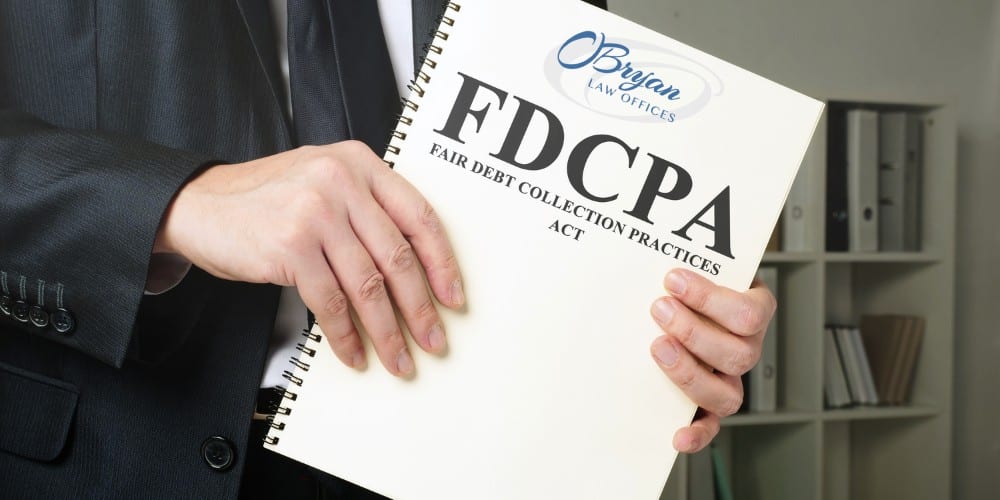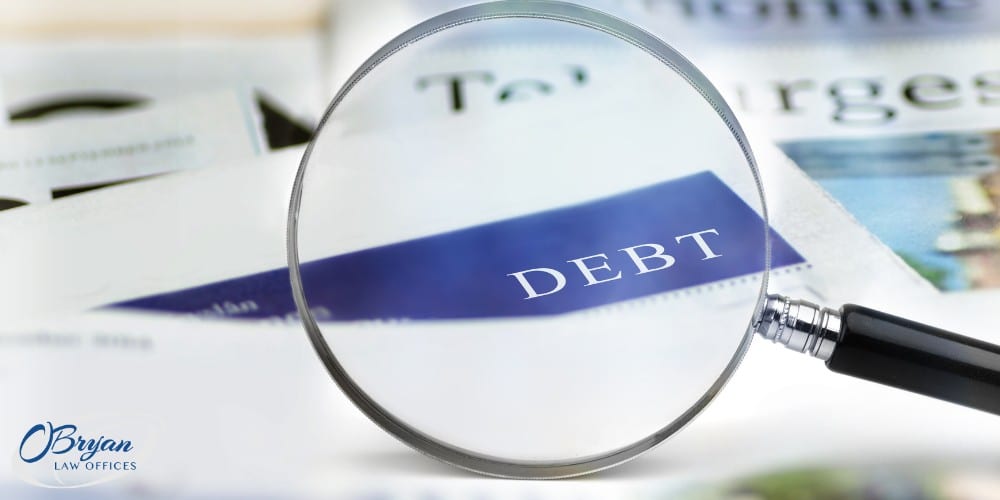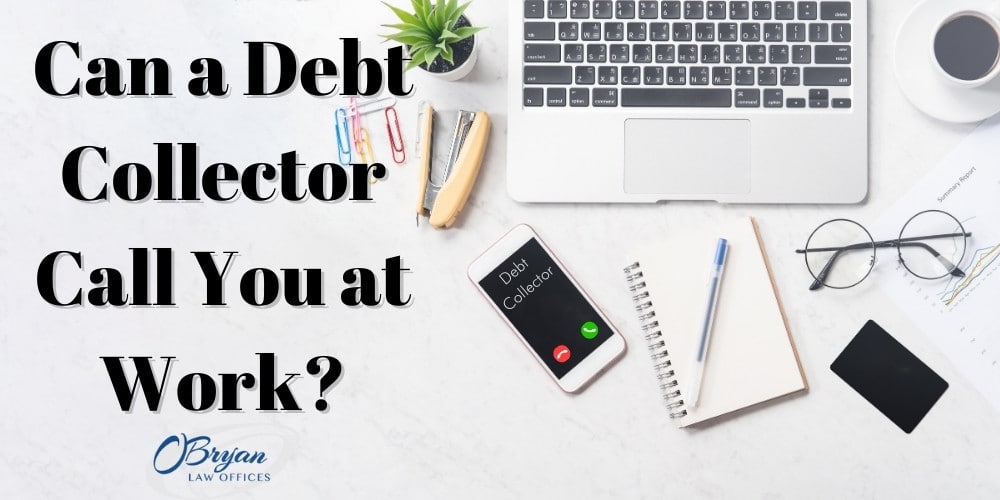If you have debt, you probably don’t need repeated calls and letters about how much you owe. Having debt collectors call you at home is hard enough, but can a debt collector call you at work? The answer to this can be complicated. Debt collectors and creditors have to follow specific rules regarding debt thanks to the Fair Debt Collection Practices Act. This act protects many consumers from harassing creditors, but it can’t protect you from everything. At O’Bryan Law Offices, we can help you stop creditor harassment for good and help you regain financial control. Our bankruptcy attorneys are different: we care about our clients. We’ve helped more than 30,000 families find debt relief through bankruptcy, and that number grows every day. For more information about our legal services and how we can help you, call us today at (502) 400-4020.
Fair Debt Collection Practices Act

In 1978, the Federal Trade Commission unrolled the Fair Debt Collection Practices Act (FDCPA). The Federal Trade Commission Act (FTCA) prohibits creditors from using deceptive or unfair practices to collect unpaid debts. The FDCPA limits the ways a debt collector can contact a consumer regarding unpaid debt. Debt collectors and creditors have to follow specific rules when it comes to contacting debtors. If debt collectors violate these rules, consumers have the right to sue them in state or federal court. Under the FDCPA, debt collectors and creditors are prohibited from:
- Contacting consumers between the hours of 9 p.m. and 8 a.m.
- Contacting the consumer at his or her place of employment if the debt collector knows or “has reason to know” that the consumer’s employer prohibits this communication
- Contacting the consumer directly when he or she is being represented by an attorney
- Threatening violence
- Threatening to harm the consumer, their reputation, or property
- Disclosing details of the debt to third parties
Most Common Violation of FDCPA
More than half (56%) of consumer complaints to the FDCPA involve creditors attempting to collect debt not owed. The next most common FDCPA violation (23%) involves debt collectors failing to send written notification about the debt. 7% of complaints involved debt collectors threatening to take negative or legal action. Debt collectors can’t threaten to sue you or suggest that your credit history will be damaged by not paying the debt. Debt collectors also cannot threaten to take legal action against you for an expired debt.
Third-Party Debt Collectors vs. Original Creditors

Under federal law, there is a distinct difference between the original creditor and a third-party debt collector. The FTCA outlines rules for original creditors, while the FDCPA handles debt collectors. Sometimes creditors pay a third-party company to collect a debt for them. In other cases, creditors may end up selling debts to debt buyers for pennies on the dollar. This allows the original creditor to retain a portion of their money without having to devote resources to collect the debt.
A debt buyer is sometimes held to the same FDCPA regulations as debt collectors, but sometimes not. Original creditors have fewer prohibitions against contacting consumers than debt collectors. Under some circumstances, a debt buyer can be considered a creditor since they “own” the debt. If a debt collector violates FDCPA regulations, consumers can sue them. If a creditor violates the FTCA regulations, the FTC doesn’t give consumers the ability to file a lawsuit.
When Can Debt Collectors Call You?

Debt collectors are prohibited from calling you at inconvenient times, which is generally between 9 p.m. and 8 a.m. Debt collectors cannot call with the intent to harass, but they can call every single day and send letters. They can also contact third parties to confirm your phone number, place of employment, or address, but they aren’t allowed to discuss the debt with anyone but you, your spouse, or your attorney. Debt collectors calling you at work can be a major headache, but it can be avoided. At O’Bryan Law Offices, we can help put an end to this constant annoyance.
Debt collectors and original creditors can contact you at work unless they have a “reason to know” that your employer prohibits these calls. Repeated personal calls at your place of employment can impact your ability to do your job. It can also cause you to get in trouble with your supervisor or manager. If a debt collector contacts you at work, tell them that your employer does not allow personal calls. Follow up with a written letter. After you make a debt collector aware of this rule, they are legally barred from contacting you at work. If debt collectors contact you or your employer after this, you can file a lawsuit against them.
Can a Debt Collector Contact Your Employer?
A creditor isn’t bound by the same rules as a debt collector, but both entities can still get in trouble for discussing your debt with a third party–including your employer. Workplace collection calls can be embarrassing and feel like a violation of your privacy. Original creditors, like a bank or a credit card company, are allowed to contact you at work about a debt unless they have a reason to know that your workplace doesn’t allow these types of calls. Debt collectors follow the same rules. If a debt collector calls your employer, they can only ask to confirm personal information in an effort to collect the debt. In many cases, debt collectors are only permitted to contact a third party once to confirm information.
Can a Debt Collector Sue You?
If you don’t pay a debt, the debt collector can sue you for the cost of the debt and any court costs. If a debt collector sues you and wins, they can get a judgment against you. This means they have a court order that allows them to collect the debt. Debt collectors with a judgment can garnish your wages, put a lien against your home or business, and even go after the funds in your bank account. Once a debt collector obtains a judgment against you, there’s little that you can do to stop them from collecting money from you. This is why it’s important to contact the team at O’Bryan Law Offices as soon as possible. The longer our team has to work on your case, the better we can protect you and your assets.
How to Stop Creditor Harassment
There’s one surefire way to stop creditor harassment. When you file for bankruptcy, the bankruptcy court grants you an automatic stay. This means that creditors are barred from contacting you regarding any debt you may owe after you file for bankruptcy. If a debt collector continues to contact you after an automatic stay is granted, they can face severe consequences. Willfully ignoring the automatic stay order can even result in the creditor paying punitive damages to the debtor. Since the main purpose of a debt collector is to collect a debt, not incur it, they often stop the phone calls and letters immediately.
The Bankruptcy Attorneys at O’Bryan Law Offices Can Help Give You Peace
Medical bills, unexpected job loss, and natural disasters are all things that send people into financial ruin every day. Millions of Americans are living paycheck to paycheck, which often means these families accrue debt just trying to keep up with life. At O’Bryan Law Offices, we help individuals and families file bankruptcy for debt relief. Debt can be a suffocating stress that accumulates quickly over time. With help from our experienced team, you can get back on your feet and out from under a mountain of debt. We can help you through every aspect of bankruptcy, from determining the best type of bankruptcy for you to restoring your credit after bankruptcy. Call us today to schedule a free consultation at (502) 400-4020.


